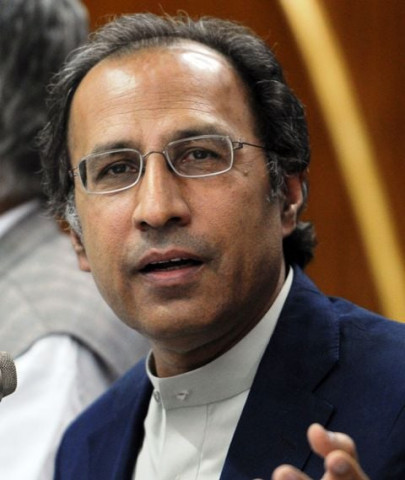Taking stock: Shaikh tries to put a brave face on economic record
Finance minister gave PM Gilani review of progress country’s economic management team made over first six months.

If the prime minister was looking for good news on the economic front, he is unlikely to have been sufficiently comforted by the ever-so-cautious finance minister’s briefing on Saturday.
Accompanied by Finance Secretary Waqar Masood, Finance Minister Abdul Hafeez Shaikh gave Prime Minister Yousaf Raza Gilani a review of the progress the country’s economic management team has made over first six months of the fiscal year that ends June 30, 2012.
The finance minister tried to put as positive a spin on the numbers as he could, especially since the prime minister said he will use the data provided by the ministry to make the case for his government’s achievements as he seeks a vote of confidence in Parliament next week. Yet the numbers are unlikely to cause much excitement in either chamber of the legislature.
On what is perhaps the single most important economic figure – the growth rate of the gross domestic product, or the total size of the economy – the finance ministry projects that GDP growth will clock in at around 4% during fiscal year 2012. This is respectable, given a worldwide economic slowdown, but hardly the sort of performance that lends itself as the basis of a re-election campaign.
The second figure (and perhaps a more keenly watched one) is that of inflation, on which the government can claim some progress, if only somewhat disingenuously.
The finance ministry has been keen to point out that the consumer price index (the most widely used indicator of inflation) touched single digits in December 2011 for the first time in over two years. Yet the average inflation rate for the first six months of fiscal 2012 remained in double digits, at 10.9%.
Meanwhile, core inflation – which excludes the more volatile figures for food and energy prices and is thus seen as a more reliable measure of inflation – remained stubbornly in double digits, suggesting that inflation has seeped into the entire economy.
The finance ministry’s proudest achievement appears to be its ability to curb government expenditure over the first six months of the fiscal year to about 45% of the annual target. In addition, the Federal Board of Revenue was able to meet its six-month revenue collection target of Rs840 billion, a 27% increase over the same period in the previous year.
Yet these numbers are unlikely to mean that the government will meet its budget deficit target. For one thing, the government has failed to reform the energy sector and eliminate subsidies, which was supposed to have happened in July last year. Having failed to do is going to cost the government about Rs350 billion in electricity subsidies, or about 130% more than what had been allocated for the year.
On the revenue side, the government has received none of the money it had assumed it would get from the United States, which is likely to make the annual target all but impossible to achieve without a heavy (and inflationary) increase in borrowing.
To be sure, there have also been some very real positive developments. Exports are up 4% and are likely to exceed the $25 billion achieved last year. Remittances are up by 19%, averaging about $1 billion a month. Foreign exchange reserves were still at around $17 billion and would likely be able to absorb the $1.2 billion repayment of an International Monetary Fund loan that is due next month.
And perhaps most importantly, for the first time in the current administration’s history, development spending is on track, with about Rs100 billion having been released for power, transportation and water infrastructure projects over the first six months of fiscal 2012.
Typically, when faced with a budgetary constraint, the first thing slashed by the government is development spending. That this has not happened this year lends at least some credence to the government’s claims of fiscal discipline.
Published in The Express Tribune, January 15th, 2012.


















COMMENTS
Comments are moderated and generally will be posted if they are on-topic and not abusive.
For more information, please see our Comments FAQ